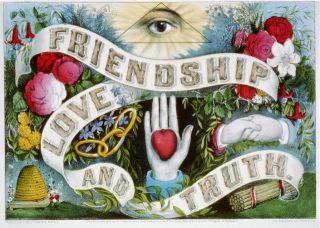Everyone wants a friend, a friend to share joys and sorrows with, a friend to care and
support in need. But finding a true friend is not easy. It is as difficult to become one.
With Friendship Day nearing again, TheHolidaySpot brings you some tips to help you be a
perfect friend to your buddies. Read these beautiful tips that not only inspire you to
become a better friend, but also a better person.
Its not easy becoming a friend or making one because a friend is not a state of
mind. Its real and its in your face. A friend is someone who makes your life worth its while a little more
than yesterday. While everybody has their own definitions of a
"friend", the long and short of it is we all need friends to make our
lives better.
We at TheHolidaySpot value our friendship as much as you do and would
like to share our ideas of how to become an ideal friend with you, for if wasn't for you we wouldn't be where we are today.
HONESTY IS THE BEST POLICY...
In friendship "honesty" is the key word. One should always be honest to his or her friends.
Don't overlook their faults, even if you have none for you are his friend!
Praise them honestly and openly.
Say you're sorry, when you hurt your friend. Don't let them assume it.
GIVE MORE THAN YOU TAKE... Be there when they need you or you may wind up alone.
Love them unconditionally, that is the only condition. Make them feel special, because aren't we all special?
Never forget them, who wants to feel forgotten.
BE SUPPORTIVE... Cheer them on, we all need encouragement now and then.
Encourage their dreams and aspiration, Life seems almost meaningless without them.
Your words count, use them wisely.
Use good judgement.
Wish them luck, hopefully good
Eamine your motives before you "help" out
Just be there when they need you
Really listen, a friendly ear is a soothing balm
FORGIVENESS... Forgive them for, "To Err is Human", and you just may end up making the same mistakes in course of time..
KEEP THE FAITH... Have faith in them. For, there is no love without trust.
Zip your lips when they confide in you
EXPRESS YOURSELF CLEARLY Know when they need a hug, and couldn't you use one?
Offer to help, and know when " No thanks" is just politeness
Quietly disagree, noisy No's make enemies
Verbalsise your feelings
HAVE FUN... Get together often, misery loves company, so does glee.
Talk frequently, communication is important.
Enjoying your friendship is the order of the day. So its not what we call a friendship if you don't feel right.
Always remember a friendship is worth it when you are able to enjoy the amazing relationship with no holds barred. Its a mutual bond for life that you cant give up.
Don't overlook their faults, even if you have none for you are his friend!
Praise them honestly and openly.
Say you're sorry, when you hurt your friend. Don't let them assume it.
GIVE MORE THAN YOU TAKE... Be there when they need you or you may wind up alone.
Love them unconditionally, that is the only condition. Make them feel special, because aren't we all special?
Never forget them, who wants to feel forgotten.
BE SUPPORTIVE... Cheer them on, we all need encouragement now and then.
Encourage their dreams and aspiration, Life seems almost meaningless without them.
Your words count, use them wisely.
Use good judgement.
Wish them luck, hopefully good
Eamine your motives before you "help" out
Just be there when they need you
Really listen, a friendly ear is a soothing balm
FORGIVENESS... Forgive them for, "To Err is Human", and you just may end up making the same mistakes in course of time..
KEEP THE FAITH... Have faith in them. For, there is no love without trust.
Zip your lips when they confide in you
EXPRESS YOURSELF CLEARLY Know when they need a hug, and couldn't you use one?
Offer to help, and know when " No thanks" is just politeness
Quietly disagree, noisy No's make enemies
Verbalsise your feelings
HAVE FUN... Get together often, misery loves company, so does glee.
Talk frequently, communication is important.
Enjoying your friendship is the order of the day. So its not what we call a friendship if you don't feel right.
Always remember a friendship is worth it when you are able to enjoy the amazing relationship with no holds barred. Its a mutual bond for life that you cant give up.









